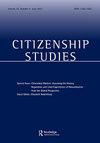Citizenship as Burden of Proof: Voting and Hiding Among Migrants from India’s Eastern Borderlands
IF 1.9
3区 社会学
Q3 POLITICAL SCIENCE
引用次数: 2
Abstract
ABSTRACT Millions of people from India’s northeastern state of Assam have to defend themselves against suspicions that they are illegal migrants from neighboring Bangladesh. I explore how one such group of individuals, who work as waste pickers in Delhi, protect their citizenship against the combined vulnerabilities of being Assamese, Muslim, and residents of an unauthorized slum. I show that they develop a split relation with the government, defined by a costly requirement to vote in their borderland villages, and by avoidance for all matters linked to everyday life. By working hard in an occupation shunned by everyone else, they seem to uphold this citizenship of extraordinary political obligation and minimal entitlement. But when this equilibrium unravels around the debt that they contract to pay for basic services and for the trip home to cast their ballot, the price of their condition determined by suspicion, is revealed.公民身份作为举证责任:印度东部边境移民的投票和隐藏
来自印度东北部阿萨姆邦的数百万人不得不为自己辩护,他们被怀疑是来自邻国孟加拉国的非法移民。我探讨了在德里从事拾荒工作的一群人如何保护自己的公民身份,免受阿萨姆人、穆斯林和非法贫民窟居民的双重身份的伤害。我展示了他们与政府形成了一种分裂的关系,这种关系的特点是要求他们在边境村庄投票,成本高昂,并且回避与日常生活有关的一切事务。他们在别人都避而远之的职业中努力工作,似乎维护了这种公民身份,即肩负着巨大的政治义务,却享有最低限度的权利。但是,当这种平衡围绕着他们为支付基本服务和回家投票而签订的债务而被打破时,由怀疑决定的他们状况的代价就暴露出来了。
本文章由计算机程序翻译,如有差异,请以英文原文为准。
求助全文
约1分钟内获得全文
求助全文
来源期刊

Citizenship Studies
POLITICAL SCIENCE-
CiteScore
3.60
自引率
11.10%
发文量
85
期刊介绍:
Citizenship Studies publishes internationally recognised scholarly work on contemporary issues in citizenship, human rights and democratic processes from an interdisciplinary perspective covering the fields of politics, sociology, history and cultural studies. It seeks to lead an international debate on the academic analysis of citizenship, and also aims to cross the division between internal and academic and external public debate. The journal focuses on debates that move beyond conventional notions of citizenship, and treats citizenship as a strategic concept that is central in the analysis of identity, participation, empowerment, human rights and the public interest.
 求助内容:
求助内容: 应助结果提醒方式:
应助结果提醒方式:


